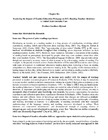Exploring the impact of teacher education pedagogy on EFL reading teacher identities: a United Arab Emirates case (Pre-published version)
Citation
Gardiner Hyland, F., (2014) 'Exploring the Impact of Teacher Education Pedagogy on EFL Reading Teacher Identities A United Arab Emirates Case'. in Bailey, K. and Damerow, R., eds.,Teaching and Learning English in the Arabic-Speaking World, London: Routledge, 83-100.
Gardiner Hyland, F., (2014) 'Exploring the Impact of Teacher Education Pedagogy on EFL Reading Teacher Identities A United Arab Emirates Case'. in Bailey, K. and Damerow, R., eds.,Teaching and Learning English in the Arabic-Speaking World, London: Routledge, 83-100.
Abstract
In response to a demand by government authorities to significantly improve educational practices in the UAE, and to simultaneously Emiratize and professionalize the teaching profession (Mograby, 1999; UAE Ministry of Education and Youth, 2000; Clarke & Otaky, 2006), Vision 2030 was developed. This plan was created to reform education in the UAE by encouraging effective teaching methods. Within this recognition of the need for reform in UAE schools and classrooms, one issue of concern to educators and teacher educators is the need to develop a culture of reading for pleasure.
However, the fostering of a reading culture among Arab students as a pleasurable activity is a challenge in both the UAE and the Arab world. This obstacle exists partly because of the belief that Arabs share an oral rather than a written culture (Shannon 2003). Within this situation, those entering the education profession in the UAE often face considerable obstacles in the government’s primary school system, particularly in the teaching of English reading. Despite the enormous wealth of the UAE, many public schools are ill-equipped, lacking basic facilities such as proper libraries. Furthermore, public libraries are not common. For example, the city of Abu Dhabi, with a population of more than 1,000,000 people, currently has only one library. A consequence of this situation is that many Emirati parents are unable to fully support their children’s learning. Moreover, schools are commonly staffed with poorly trained and poorly paid Egyptian, Lebanese, Syrian, and Tunisian teachers, who operate within a traditional behaviorist model of transmission based on rote memorization. Ironically, these same teachers supervise Emirati student teachers who have attended extremely well-funded colleges and universities, and have been exposed to radically different Western ideas of the processes of teaching and learning reading.
Within the context outlined above, this research provides insights into the teaching of reading in UAE primary government schools. This study specifically demonstrates, through innovative examples, how Emirati student teachers aspire to make a difference in increasing the quality of the teaching of reading to young learners.
Keywords
United Arab EmiratesArabic-speaking
Teacher identities
Teacher education pedagogy
EFL


